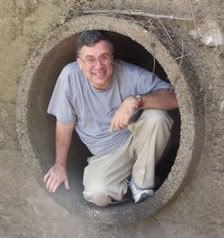Shatokhin's Complaint---Russian Job Applicant "Insulted" By American Attorney Who Calls Him 'Dummy' and 'Typical Russkie'
It doesn’t appear that any laws were broken or that the behavior of Manhattan attorney Jonathan David Bachrach toward Vyacheslav Shatokhin was symptomatic of any broader pattern of job discrimination against Russian-speaking immigrants in New York City. Yet Shatokhin, a former prosecuting attorney who emigrated here from Uzbekistan in 1997, said he was deeply insulted and traumatized when an unsolicited resume he sent to Bachrach in March, 2005 while searching for a job as a legal aide, came back in the return mail covered with comments scrawled by Bachrach such as “Dummy!”, “Sir, your work stinks—look at all your mistakes!” and “typical Ruskie--knows everything”.
“Mr. Bachrach’s insults and racial slurs upset me deeply--to the point where I lost the confidence to go on applying for jobs in the legal profession,” said Shatokhin, a 45-year-old Brooklyn resident who presently works as an office manager. Noting that he has failed in efforts to win even an apology from Bachrach in the 18 months since, Shatokhin said, “I find it very frustrating that Mr. Bachrach should be allowed to insult me simply because I am an immigrant and do not have perfect English.”
Bachrach, a 60-year-old attorney Manhattan attorney specializing in commercial litigation, said that his seemingly sarcastic marking-up of Shatokhin’s resume was actually motivated by good will on his part. “I was trying to help him,” Bachrach explained to this reporter. “This guy was telling me he wanted a job. I was telling him that his resume was so poor in so many ways that he would do himself a service by not sending it out, because whoever received it would not hire him.”
Others interviewed about the incident took a dimmer view of Bachrach’s conduct. Responding to a query about the matter from the Jewish Week, Congressman Jerrold Nadler (D-NY) issued a statement asserting that by ridiculing Shatokhin with “a written tirade of insults and ethnic stereotyping” Bachrach “demonstrated a level of bigotry and moral blindness not worthy of an officer of the court or any decent member of our society. He owes Mr. Shatokhin an apology.”
Sam Kliger, director of Russian Jewish Affairs at the American Jewish Committee, called Bachrach’s actions “disgusting and inappropriate,” adding, “We are trying to incorporate Russian Jews into American Jewish life and the social fabric and here we see someone relating to an immigrant in such an arrogant and uncivilized way.”
Among the many comments he placed on Shatokhin’s resume, Bachrach pointed out that Shatokhin should have capitalized a word, and had left out a comma, as well as noting that Shatokhin wrote he had an expertise in ‘Blue Banking Law’ when he clearly meant Blue Sky Banking Law, and in ‘Immigration and Nationality Law’, when he probably meant ‘Immigration and Naturalization Law’. Noting that Shatokhin claimed 28 areas of “core specialization” Bachrach wrote to the job applicant; “When I see you ‘specialize’ in everything, I know you specialize in nothing”….adding, in reference to Shatokhin’s claim of a wide range of legal expertise; “typical Ruskie, knows everything”. Bachrach also wrote, “Dummy! What kind of a position are you seeking? Office manager?” and after affirming “Your work stinks,” Bachrach asked rhetorically, “Who would hire you from a resume like this?”
Shatokhin, said he has sent hundreds of unsolicited resumes to attorneys around New York seeking work as a paralegal but never received a response like that of Bachrach. Acknowledging in his less-than-perfect English that his resume contained errors and omissions, Shatokhin said, “I can understand if an attorney decided that my qualifications were not good enough, and threw my resume in the garbage. But receiving this reply full of verbal abuse and racial comments was painful and humiliating to me.”
After receiving Bachrach’s mark up of his response in the mail, Shatokhin sent a complaint to the New York State Bar Association asking that body to consider revoking Bachrach’s license to practice law. The Bar Assocation responded it had no authority in the case, whereupon Shatokhin filed a complaint with the Departmental Disciplinary Committee of the New York State Supreme Court’s Appellate Division--First Judicial Department, which opened an investigation and forwarded Shatokhin’s complaint to Bachrach. The attorney quickly dispatched a three-page-letter to the Committee, asserting that “I took fifteen minutes of my valuable time to try and help a complete unknown stranger—pro bono. I wrote helpful comments and mailed the resume to the person named thereon.” Claiming that he had included his business card with the resume “in case the writer wanted to talk to me about how to improve his resume”, a claim Shatokhin says is untrue, Bachrach wrote, “Now instead of thanking me for trying to help him improve his resume pro bono, the Complainant is seeking to have me disbarred! Can he spell ‘ingrate’?”
According to Bachrach; “I violated no section of the Disciplinary Rules—but ended up proving the old axiom—‘No good deed goes unpunished’…Complainant needs to understand that this is not Russia over here. Over here, we have freedom of speech. Unsolicited, he sent me—a total stranger—some of his work. I wrote back to him that his work stinks…”
On September 16, 2005, the Departmental Disciplinary Committee wrote to Shatokhin that while it “understands your dismay at Mr. Bachrach’s choice of words when he critiqued your resume…his conduct did not involve a violation of the Code of Professional Responsibility.” Since then Shatokhin has sought to interest the media in the case, stressing,”While I don’t want to hurt Mr. Bachrach or take away his livelihood, I can’t just let the matter rest. He doesn’t seem to understand how badly he hurt me.”
When contacted by this reporter, Bachrach dismissed Nadler’s call for him to apologize to Shatokhin as motivated by “an attempt to win votes”. Asked if his scrawling ‘typical Ruskie’ on Shatokhin’s resume was not as hurtful as would be someone writing ‘typical Jew’ on his own resume, or that of another Jewish person, Bachrach responded, “I think there are different ways people can take these things…Of course, he felt insulted….. I get insulted every day, but I try not to make it my raison d’etre.”
Bachrach added, “You may feel it is better copy to (ask); ‘Did I call him a stinking Ruskie?’ Yet it might be better to say that despite (Shatokhin’s) obvious inability to write English and his inappropriate concepts and being grandiose, this guy (Bachrach) was still willing to help him."
-end-
Continued...





